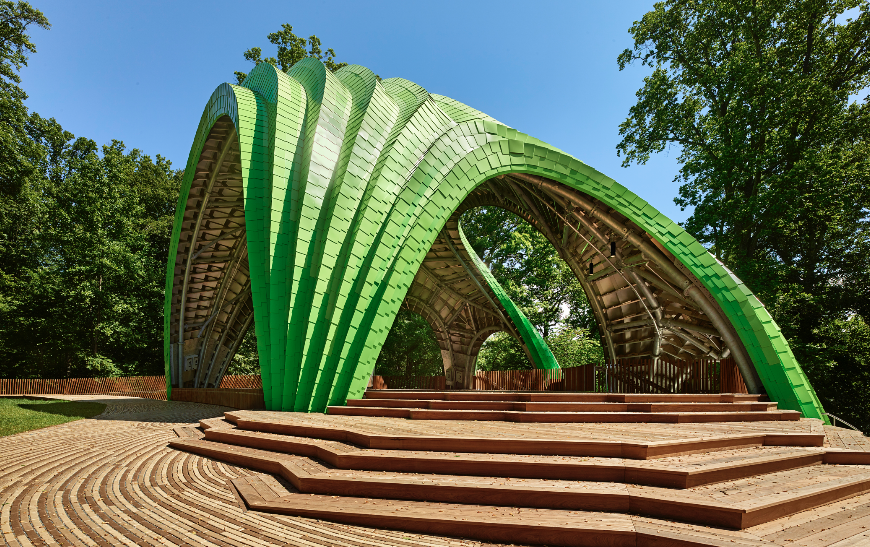From pearlescent and iridescent coatings to highly accurate color-matching tools to programmable, color-changing LED lights, color is taking on a bigger and increasingly high-tech role on building projects.
The widespread growth of colorized materials—from metal wall and roof panels to glass and glazing systems, to metal mesh assemblies—and the availability of custom colors across a broad range of product lines have provided architects and designers with almost limitless options for exterior and interior design projects.
Technology tools like 3D modeling software and color-matching apps have taken much of the guesswork out of evaluating colors and color palettes for building design projects. And advances in manufacturing—from new textile printing methods to novel coating formulations—are leading to breakthroughs in hues, patterns, textures, and special effects in colorized materials and finishes.
Given the “color craze” in architecture, it is no surprise that most design professionals believe that color plays a more-critical role in today’s building design projects than those from a decade ago.
Findings from BD+C's 2020 Color Trends Report
Two-thirds of architects, interior designers, and color experts surveyed between December 2019 and March 2020 by Building Design+Construction for the 2020 Color Trends Survey said that color on design projects (interior spaces and exterior design) is more important today than it was a decade ago. And fewer than 2% believe color is less important.
The growth in demand for color in the commercial, institutional, and multifamily building sectors is being driven by several converging trends. For one, clients are more willing to accept risk and variation on their projects, according to survey respondents.
“Especially for interiors, the story told by a color palette is crucial to creating an experience that can be differentiated from the norm,” said one architect respondent.
The rising cost of materials and construction is another important consideration: “Color is one of the easiest ways to add impact for the least amount of cost, thus more important today with the rising costs of everything.”
The final PDF report of BD+C's 2020 Color Trends Survey includes data on:
- Innovations in color and colorized materials
- Specification trends in color and colorized materials
- Source of color expertise and inspiration in design firms
- The importance of color on today's building projects (interior and exterior applications)
- The importance of color in 2020 vs. 2010
- Reasons for the change in the importance of color on building projects
- Use of special effect coatings
- Biggest innovations in color related to interior or exterior building design
Download the 2020 Color Trends Survey report (short registration required)
Special thanks to Sherwin-Williams Coil Coatings
for their support of this BD+C editorial research project.
More at coil.sherwin.com.
Related Stories
Adaptive Reuse | Oct 22, 2024
Adaptive reuse project transforms 1840s-era mill building into rental housing
A recently opened multifamily property in Lawrence, Mass., is an adaptive reuse of an 1840s-era mill building. Stone Mill Lofts is one of the first all-electric mixed-income multifamily properties in Massachusetts. The all-electric building meets ambitious modern energy codes and stringent National Park Service historic preservation guidelines.
MFPRO+ News | Oct 22, 2024
Project financing tempers robust demand for multifamily housing
AEC Giants with multifamily practices report that the sector has been struggling over the past year, despite the high demand for housing, especially affordable products.
Performing Arts Centers | Oct 21, 2024
The New Jersey Performing Arts Center breaks ground on $336 million redevelopment of its 12-acre campus
In Newark, N.J., the New Jersey Performing Arts Center (NJPAC) has broken grown on the three-year, $336 million redevelopment of its 12-acre campus. The project will provide downtown Newark 350 mixed-income residential units, along with shops, restaurants, outdoor gathering spaces, and an education and community center with professional rehearsal spaces.
Office Buildings | Oct 21, 2024
3 surprises impacting the return to the office
This blog series exploring Gensler's Workplace Survey shows the top three surprises uncovered in the return to the office.
Healthcare Facilities | Oct 18, 2024
7 design lessons for future-proofing academic medical centers
HOK’s Paul Strohm and Scott Rawlings and Indiana University Health’s Jim Mladucky share strategies for planning and designing academic medical centers that remain impactful for generations to come.
Sports and Recreational Facilities | Oct 17, 2024
In the NIL era, colleges and universities are stepping up their sports facilities game
NIL policies have raised expectations among student-athletes about the quality of sports training and performing facilities, in ways that present new opportunities for AEC firms.
Codes and Standards | Oct 17, 2024
Austin, Texas, adopts AI-driven building permit software
After a successful pilot program, Austin has adopted AI-driven building permit software to speed up the building permitting process.
Resiliency | Oct 17, 2024
U.S. is reducing floodplain development in most areas
The perception that the U.S. has not been able to curb development in flood-prone areas is mostly inaccurate, according to new research from climate adaptation experts. A national survey of floodplain development between 2001 and 2019 found that fewer structures were built in floodplains than might be expected if cities were building at random.
Seismic Design | Oct 17, 2024
Calif. governor signs limited extension to hospital seismic retrofit mandate
Some California hospitals will have three additional years to comply with the state’s seismic retrofit mandate, after Gov. Gavin Newsom signed a bill extending the 2030 deadline.
MFPRO+ News | Oct 16, 2024
One-third of young adults say hurricanes like Helene and Milton will impact where they choose to live
Nearly one-third of U.S. residents between 18 and 34 years old say they are reconsidering where they want to move after seeing the damage wrought by Hurricane Helene, according to a Redfin report. About 15% of those over age 35 echoed their younger cohort’s sentiment.



















